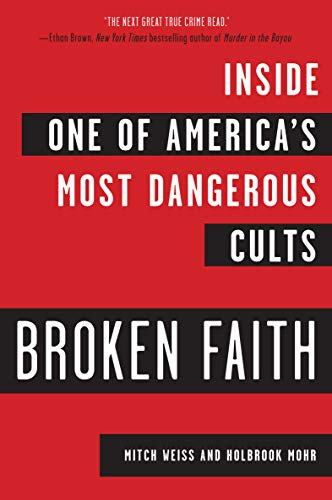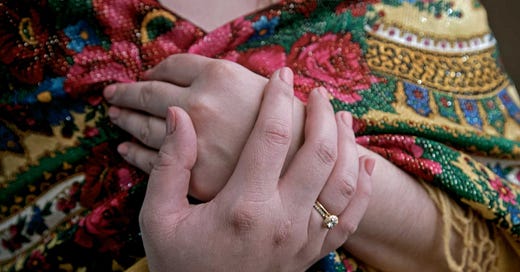Ukraine and anti-LGBTQ laws
Welcome to the 8th edition of North Carolina Religion Roundup: Ukraine, protecting LGBTQ youth and more.
Happy Friday! Thanks for reading the 8th edition of North Carolina Religion Roundup, a newsletter that highlights major religion news and trends in the Triangle and greater NC. (If you’re interested, you can read more about the newsletter and why I started it here.)
My name is Hannah. When I sent the last newsletter, I was the education and local government reporter at The Chatham News + Record in Chatham, NC. In March, I started a new job at EducationNC, a nonprofit news outlet covering public education across the state. In addition to covering community colleges and postsecondary access at EdNC, I’m also covering faith, which I’m really excited about!
I’m also a M.Div. student at Duke Divinity School, where I just started another semester. It’s been an exciting — albeit busy — few months. Needless to say, as a result, this newsletter is coming to you much later than its typical biweekly pattern. I’ve been thinking about how to sustainably keep writing this newsletter, and brainstorming any changes needed moving forward. (Also, the last two months have just gone by really, really fast.) That said, the newsletter will resume its twice-monthly pattern starting today, with every other newsletter now only featuring a more detailed list of religion stories to follow. As always, I’d love any thoughts or feedback regarding parts of the roundup you particularly like, and/or anything you’d like to see in the future. Plus, I’d love it if you’d share this newsletter with a friend.
Thanks for still following along. Happy reading!
This week:
In Story to Follow, I take a look at how faith groups have supported Ukraine.
In Deep Dive, I highlight how religious leaders are working to protect LGBTQ youth in light of recent legislation affecting LGBTQ rights.
And In a Nutshell, I highlight some NC religion stories to keep an eye on.
NEW: In What I’m Reading, I introduce you to a recent longform essay and investigative book I recommend.
Story to Follow: Faith response to Ukraine
Since Russia’s Feb. 24 invasion of Ukraine, the war has highlighted the role of Orthodox Christianity, Catholicism and Judaism in Eastern Europe. (Though Ukrainian President Volodymyr Zelenskyy is Jewish, Russian president Vladimir Putin tried to justify the “special military operation” as having the goal to “denazify” Ukraine.)
Religious communities around the world continue to respond. The Vatican offered to mediate between Russia and Ukraine, while Orthodox communities in both countries call for different visions of peace. Ukrainian-American Christians and Jews have fundraised and prayed for peace, and religious leaders across religions and denominations have condemned the war. Humanitarian aid and faith organizations set up field hospitals and shelters, while also advocating for federal aid and refugee protections. Read this Religion News Service explainer for more information on how the war is linked to religion.
In North Carolina, Triangle-based faith groups fundraised for charities that aid refugees, the News & Observer reported.
“That’s a harrowing experience of insecurity and vulnerability,” Father Jacek Orzechowski, pastor of Immaculate Conception Church in Durham, told the N&O. He fled his native Poland with his family in the 1980s. “I remember from when I was a child, during a time when there was a fear of Soviet intervention in Poland and a specter once again of a foreign invasion from the east. I can easily place myself in the shoes of people who are now fleeing for their safety.
“And this is not only a political and humanitarian issue, but a religious one as well,” he said. “As Christians, we are our brothers’ and sisters’ keepers.”
Triangle Jews also organized to support Ukrainians, the N&O reported, through prayer, solidarity and donations.
The Ukrainian Association of North Carolina estimates there are more than 19,000 people of Ukrainian descent living in North Carolina, most of them clustered in the areas around Charlotte, Raleigh and Asheville.
A new Ukrainian Catholic church opened in Garner last month, the Assembly’s Kate Medley reported in a beautiful photo essay, where parishioners prayed for a miracle together.
“It is not just the people living in Ukraine who are under attack,” church deacon Michael Sudik told Medley. “For the Ukrainians living in North Carolina, it’s not as if we’re going to turn a corner and face a Russian shooting us on-site, but there is a deep angst.”
“The Ukrainian soldiers have said, ‘We feel your prayers from the other side of the world.’ And this is why we continue to pray,” parishioner Vera Lyktey also said. “The Ukrainian army has been outnumbered since the beginning, but we pray for a miracle.”
I highly recommend reading the essay in full; which includes many more beautiful photos like the one below.
Victoria Nytka, 32; From the Ivano-Frankivsk region; Hustka, a traditional Ukrainian head covering. Kate Medley / The Assembly
Deep Dive: Anti-LGBTQ legislation and religious responses
Across the country, at least a dozen states recently considered legislation restricting LGBTQ rights, NPR reported last month, including Florida’s “Don’t Say Gay” bill.
The Florida bill prohibits instruction on sexual orientation or gender identity for K-3 students, though none of these grades are receiving sex education currently, according to the Tampa Bay Times. The bill also requires schools to notify parents of offered health-care services and allow them decline specific services. The bill doesn’t prohibit students from talking about LGBTQ family members or themselves, but Florida Republicans have said they intend to curb discussions on gender identity and sexuality through the bill. The vagueness of the law could also create a chilling affect, as was feared by many North Carolina educators concerning last year’s vetoed bill on teaching history.
Other bills and laws across the country similarly aim at reducing discussion of gender and sexuality in schools and curriculum. In Oklahoma, a senate bill would ban books from school libraries that focus on "the study of sex, sexual lifestyles, or sexual activity." Tennessee's HB 800 bans books and instructional materials "that promote, normalize, support, or address lesbian, gay, bi-sexual, or transgender issues or lifestyle." South Carolina’s governor signed a bill into law this week that would ban transgender students from playing girls’ or women’s sports in public schools and colleges, PBS reported, joining about a dozen states that have passed similar laws in the last two years. Texas and Alabama proposed bills also seeking to ban hormone treatment for transgender youth and make gender-affirming care from doctors a felony.
Like any group, religious people — even within the same faith or denominational tradition — are not a monolith, so faith leaders have responded in a variety of ways to the laws. Of course, many of the Republicans proposing such legislation are publicly Christian, and some invoke their religious beliefs as partial motivation for the bills. Some parents who generally support transgender youth simultaneously support restrictions on when children should learn about gender and sexuality. Still, many faith groups have opposed the legislation, as is the case in Texas, where multiple pastors and rabbis are speaking out against the governor’s order.
In North Carolina, religious leaders have advocated for LGBTQ communities before — most notably in response to the 2016 bathroom bill and Lt. Gov. Mark Robinson’s remarks demeaning the LGBTQ community. Robinson later stood by his statements, among which he said from a pulpit that the transgender rights movement is “demonic” and “full of the anti-Christ spirit.”
NC religious leaders were among those calling on him to apologize and meet with faith and community leaders or else resign.
“I want the queer community to hear very clearly, this is not rooted in God,” Rev. Vance Haywood, pastor of St. John’s Metropolitan Community Church in Raleigh said last October. “It is not rooted in Christianity. We are worthy. We are not filth. We are created in the very image of God. God loves us just as we are because he created us as we are. Where you hear stuff like this (comments made by Robinson), know it's coming from a place of maybe hurt, maybe a place of power grab, but it certainly isn’t coming as a message from God. It is theological malpractice, and it is heresy.”
I spoke with Rev. Haywood back in April 2020, about his LGBTQ-affirming theology and church, which you can read here if you’d like. And last month, the Charlotte Observer wrote about LGBTQ Christians who practice their faith even after being rejected by churches for their sexuality.
As the 2024 General Election approaches — and Dem. Gov. Roy Cooper’s last term expires — we should keep an eye out for any proposed legislation concerning LGBTQ rights, as well as how faith groups in the state respond.
In a Nutshell:
NC judges side with Catholic diocese, say no second chance for child sex abuse lawsuits, from the Charlotte Observer
Last month, Muslims, Jews and Christians each celebrated holy holidays — Ramadan, Passover and Easter, respectively. At the convergence of the holidays, Religion News Service wrote about how the three faiths are taking stock of COVID-19 losses and gains.
‘It’s not easy. But nothing is easy’: How a top chef ran a busy kitchen during Ramadan, from the N&O
Wilmington’s Castle Hayne New Beginning Christian Church to build affordable housing near sanctuary, by Wilmington StarNews. The 68-unit complex will be geared toward families making less than 60% of the median area income (80% of a median area income is typically considered the starting point for affordable housing).
The Islamic Association of Raleigh (IAR) hosted its annual open house in March, with over 150 non-Muslims in attendance. The open house featured speakers Br. Glenn Silver from IAR & ONE Wake and Dr. Mona Hassan from Duke University.
Jews say making daylight saving time permanent threatens morning prayer, by RNS. Senators unanimously passed the Sunshine Protection Act which would make daylight saving time the permanent standard time across the United States in March, something N.C. lawmakers have previously tried to do.
NC pastor: Another death in another NC jail. Do we care at all?
Jehovah’s Witnesses increase as virtual meetings, ministry, conventions keep congregants active and safe, from the Chatham News + Record
Report: The African Methodist Episcopal (AME) Church suspends payments to retirees, investigates missing pension funds. In 2020 the church claimed more than 2,500,000 members and 7,000 congregations internationally and across North America, including in North Carolina.
Moral Monday returned to Raleigh with Rev. William Barber in high spirits ahead of June 18 D.C. march, the N&O reported, with labor organizers and workers seeking to unionize and members of the clergy speaking to attendees.
Duke University divided over Israel’s treatment of Palestinians — and antisemitism, RNS reports. For months, the local Duke chapters of Students for Justice in Palestine and a new group, Students Supporting Israel, have been in a virtual funding feud.
NC legislature will require church with no opioid service history that previously received a $10 million addiction grant to partner with experienced providers and to report how money is spent, from WRAL
White Evangelicals Twice as Likely to Want to Ban Abortion, Christianity Today reports on Pew Research ahead of a possible decision to rescind Roe v. Wade.
A transqueer Latinx theologian writes about reaching ‘A Path to Our Liberation,’ by RNS. Robyn Henderson-Espinoza is on Duke Divinity’s consulting faculty.
And last, a feature from February in honor of my continued celebration of UNC’s NCAA season: “First-year UNC coach Hubert Davis reaches 20 wins with Christ as 'foundation of who I am,’” from Sports Spectrum
~What I’m reading ~
By popular demand*, I’m introducing this new section to highlight religion-related books/essays I’m reading.


*OK, in full transparency, four people separately requested this. It’s all relative of course, but four of the same request from different, unrelated people felt kind of significant.
That's it for this week's edition of North Carolina Religion Roundup. Thanks for reading. Until next time. And in the meantime, I gladly welcome any tips, feedback or news you think I haven’t included but should in future editions. — Hannah




